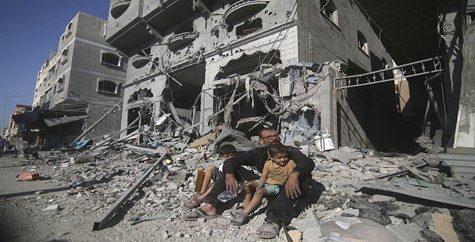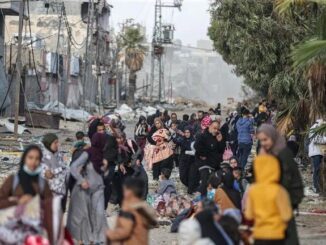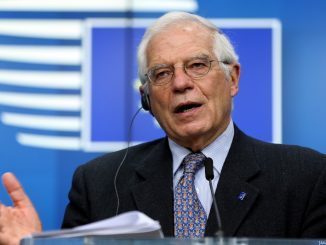
A new poll indicates that most Saudis view the Palestinians and the wider Arab and Muslim worlds as the victors in the Gaza war
This comes as a rising number of journalists and pundits in the Kingdom portray Israel as weakened and “defeated”, according to Amwaj Media.
At the same time, attacks on Israeli-linked shipping in the Red Sea by Yemen’s Ansarullah movement—better known as the Houthis—are fueling Saudi security concerns. Riyadh appears worried about the prospects of a broader regional conflagration.
A December 21 opinion poll conducted by the Washington Institute for Near East Policy found that most Saudi respondents agreed with the statement that “despite the destruction and loss of life, this war in Gaza is a win for the Palestinians, the Arabs, and the Muslims.”
According to the same survey, there has also been a sharp decline in support among Saudis for any kind of contact with Israel—including business ties. This is an apparent reversal from the situation prior to the Gaza war, when a rising number of people in the Kingdom appeared open to commercial links.
The poll additionally found that some 81% of Saudi respondents agreed that Iran and its allies across the region “are reluctant to help the Palestinians.”
Meanwhile, almost three months into the Hamas-Israel war, some Saudi journalists and pundits are emphasizing the “failure” of the Israeli military campaign.
Writing in Al-Jazirah daily, Hassan Al-Yamani charged that “Israel is a fragile entity that cannot alone confront the Palestinian resistance.” Yamani also argued that western support for Tel Aviv “did not succeed in saving the [Israeli] entity, even if it protected it from scandalous defeat.”
Writer Khalid bin Hamad Al-Malik asserted that “the Israeli enemy is trying to absorb the tension and anger of its citizens by propagating information about imaginary victories over the Palestinians’ resistance in Gaza.”
However, journalist Saleh Al-Fahid predicted that “an Israeli victory [in the Gaza war] is inevitable.” In this vein, he argued that the “best outcome of the war in Gaza is for the inevitable Israeli victory to seem like a defeat, considering the cost Israelis have paid to score it.”
Questioning if there will be any winner in Gaza, Arab News chief editor Faisal J. Abbas wrote, “No matter how this ends, the current leaderships of both Hamas and Israel are finished—a fitting end for a couple who have for so long been unlikely tag-team partners in their unwavering commitment to killing any prospect of peace.”
Despite the significant increase in the popularity of Hamas among Saudis, according to the Dec. 21 poll, the Palestinian movement is still perceived as a hostile actor by the Kingdom given its links with Iran and the Muslim Brotherhood.
If “Israel is our biggest enemy,” affirmed Khaled Al-Suleiman in the leading Okaz daily, “There is another enemy that Arab sentimentalists must defeat first: themselves.” Suleiman posited that “behind every Arab disaster” lies “a tyrant who believes he is the heavens’ gift to his people.” He also asked whether Hamas leader Yahya Sinwar questioned his decisions after having “seen the massive destruction…and the flood of death that hit Gaza.”
Saudi scholar Hesham Al-Ghannam argued that in the view of Riyadh, what is taking place in Gaza “has gone beyond Hamas since the first days [of fighting]…the brutal and criminal war carried out by Israel has effects that go beyond Hamas.”
While Hamas has gained more sympathy among Saudis, the war in Gaza does not appear to have affected broader views towards the Iran-led ‘Axis of Resistance’. Apart from Hamas and Palestinian Islamic Jihad, the regional alliance network brings together the Houthis, Lebanese Hezbollah, Shiite armed groups in Iraq, and Syria.
Referring to the instability in the Red Sea area due to Houthi attacks, Saudi senior journalist Tariq Alhomayed argued that “no harm has been done to Israel; instead, the harm is primarily to the countries of the region.”
Saudi intellectual Abdul Rahman Al-Rashed warned of the spillover effects of the Gaza war, arguing that “Tehran’s strategy, by using the Houthis as their agent, was not only to control Yemen and threaten Saudi Arabia and other Gulf states, but also to reach the Bab Al-Mandab to maximize its regional role and influence.”
The context/analysis: Amid the regional diplomatic efforts to stop the Gaza war and revitalize the Israeli-Palestinian peace process, Saudi Arabia is finding itself in a difficult position. On the one hand, Riyadh has a clear interest in maintaining open channels of communication with Tel Aviv, and continuing to dangle the prospect of normalization. On the other hand, the Kingdom needs to take into account and address pro-Palestinian sentiments among its citizens, not to mention its standing in the region.
Managing the Palestinian cause has been a key component of Saudi state identity, as showcased by the 2002 Arab Peace Initiative. It is also a major reason why the royal family has turned down normalization with Israel at least so far.
Despite the shifts in domestic sentiments suggested by the Dec. 21 poll, opening up to the Israeli economy—one of the most dynamic and innovative in the region—would help the Kingdom achieve the growth and diversification objectives of Vision 2030.
Although the Palestinian cause remains important to the Saudi leadership, national security priorities continue to shape the country’s foreign policy agenda.
Security concerns are likely to greatly shape how the Kingdom approaches action plans for “the day after” in Gaza, including any role for Hamas in governance arrangements. Of note, Riyadh has long experienced tensions with the Palestinian movement, preferring to deal with the Palestinian Authority as its partner.
Saudi Arabia’s decision to at least publicly refrain from joining ‘Operation Prosperity Guardian’—the US-led maritime mission in the Red Sea—clearly illustrates an interest in avoiding derailing a potential peace deal with the Houthis.
The future: Despite the toughening stances on Israel in the media and among ordinary citizens in Saudi Arabia, the Kingdom is likely to continue its diplomatic approach, with an emphasis on providing humanitarian aid and promoting de-escalation.
Saudi Arabia’s main focus and objective are to promote a stable regional environment to enable Vision 2030—both in Bab Al-Mandeb and the Strait of Hormuz. As such, the Kingdom will likely continue to engage with the Houthis and Iran.
While Riyadh has not permanently shelved the prospect of normalization with Israel, changing domestic sentiments and the broader regional picture have made it more difficult for Saudi Arabia to align with a key foreign policy objective of the Joe Biden administration.



